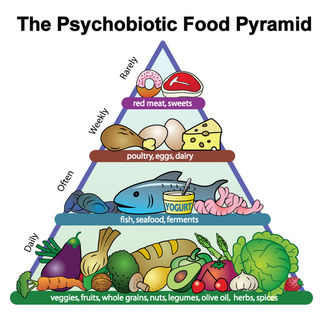Diet
Can You Eat Yourself Happy?
Introducing a new food pyramid for a better mood.
Posted August 26, 2019 Reviewed by Lybi Ma
"Health food may be good for the conscience but Oreos taste a hell of a lot better." —Robert Redford
Can food make you happy? (Excuse me while I lick the Cheeto-dust off my fingers.) Of course, it can, especially in the short term. Have you ever rolled your eyes heavenward while demolishing a slice of cognac-soaked tiramisu?
But these quickie bites may be our undoing. Poor diets mess with our gut, which, amazingly, can lead to depression and anxiety.
After some 50 years of noshing deliciously processed treats, depression is now the number-one cause of disability in the world. The standard American diet (SAD) is making us miserable.
How did we get here?
It started with an inadvertent experiment on the entire population of America, the result of a series of bad decisions that ultimately led to a tasty, but nutritionally empty diet. Perversely, we are busily exporting this epic gastronomic failure to the rest of the world.
The tragic tale began with some bad science in the 1960s that unfairly demonized fats. It quickly picked up steam with some lousy politics along the lines of "government doesn't have the luxury of waiting for the science to come in." (For some reason, that never turns out well.)
Based on that lack of expertise, the government then published a food wheel that was created by the USDA with significant input from agribusiness. They used their impressive lobbying muscle to ensure that we ate lots and lots of refined grains. The food wheel was the precursor to the famous, and similarly flawed, food pyramid, and it was a big hit with grain farmers.
Add to the mix some corporate greed by companies who figured out how to game the system to produce almost everything using government-subsidized grain, especially corn. That, almost inevitably, led to replacing fat with syrup and starch.
That sounds like a conspiracy, except that it was all done in full view of the public. We lapped it up.
The mood starts in the gut
It is completely unintuitive, but it turns out that many of our mental issues start in the gut. Not all depression is gut-oriented, of course. Life can throw curveballs and mess with our minds—and there can be strictly medical reasons as well. But we've known for centuries that gut problems can lead to mental anguish, psychosis, and anxiety.
Surprisingly, it is only with the 21st century that we have really understood the beneficial aspects of our gut microbes. They form a key part of the gut-brain axis, which is rapidly changing the way we look at how our emotions and behavior are regulated.
You've heard of probiotics, and perhaps prebiotics, food for probiotics. But have you heard of psychobiotics? These are probiotics and prebiotics that improve your mood. Psychobiotics include bacteria like those found in fermented foods including yogurt, kombucha, kefir, and kraut.
Psychobiotics also include complex sugars called fiber. Beneficial bacteria simply love fiber. You know, that stuff we've been refining out of food for the last 50 years.
You should get at least 30 grams of fiber per day. Hah! Only one in 20 Americans can manage that. The rest of us are eating delicious white bread, soft cakes, and other fiber-free foods, starting with breakfast bagels and moving on to late-night ice cream.
We eat like children, scarfing the yummy treats and promising to eat some broccoli tomorrow. It's killing us. It's making us diabetic, overweight, anxious, and depressed. But it sure tastes good.
The most unusual organ
We all have around three pounds of microbes in our gut. I know, it makes me a little queasy too. Why do we tolerate this alien invasion? It's simple: We have no choice.
Microbes are going to follow the food, no matter what we do. We have, over the millennia, arrived at a truce. The good microbes will keep out the pathogens, and in return, we will feed them a continuous buffet.
The microbes in your gut act as the royal guards of immunity. Before your immune system knows that pathogens are even in the neighborhood, your gut microbes are already fighting back. Most pathogens are destroyed quickly with no fuss, because you have 100 trillion microbial bouncers in your gut, ready to deal with unlucky intruders.
But if you don't feed your guardian microbes properly, they won't be able to mount an effective counterattack. If pathogens are able to gain a foothold, they can disturb the lining of your gut. That lining is one cell thick, a ridiculously thin barrier against troublemakers. Pathogens can burrow and dig into this lining, allowing toxins or bacteria to leak into your bloodstream. Your heart obligingly pumps those potential poisons to every organ in your body, including your brain.
The root of all evil
Scientists now believe that almost all inflammatory diseases start in the gut, including diabetes, heart disease, arthritis, Parkinson's, Alzheimer's, and mental issues like depression and anxiety. Beneficial bacteria in your gut are therefore of utmost importance to your overall health and mood.
Psychobiotic bacteria even produce neurotransmitters like dopamine and serotonin, two popular targets of antidepressants. So while those short-term fast foods can provide a jolt of joy, the long-term effect is a rotten set of microbes in your gut, unable to defend against the bad guys, and ineffective at lifting your mood.
What to do?
Step number one is modifying your diet to support your psychobiotic microbes. Here is a food pyramid that shows what you should really be eating.

The foods at the bottom are the ones to concentrate on. This is a lot like the Mediterranean diet, heavy on veggies, with some seafood to add healthy omega-3 oils to your diet.
Along with the pyramid, here are some more tips to grow a healthy set of gut microbes.
- Stop eating sugar. Sugary foods feed pathogenic bacteria. Sugar is added to so many processed foods, it can be hard to escape. So check those labels. Better yet, cook your own food so you know what you're eating.
- Eat high-fiber veggies. These include foods like asparagus, leeks, artichokes, and garlic. The fiber in these foods will pass through your small intestines intact and make it to the colon to feed your healthy microbes. Grains are great if they are whole grains, and you can tolerate them. But refined grains are not much better than sugar.
- Eat fermented foods. This is a great way to add some good bacteria to your diet. Most of these microbes will not stick around in your gut, but they will alter the environment for the better as they pass through. That means you should make this a daily routine. Excellent choices: yogurt, kefir, kombucha, and kraut.
- Eat some fish. Omega-3 oils, found in fish like salmon, reduce inflammation and keep your body from going overboard and attacking your own tissues. If you're a vegetarian or vegan, look to foods like walnuts to get your omega-3.
- Try prebiotics. If you can't get enough fiber from veggies, try topping off with prebiotic supplements. These are complex sugars called oligosaccharides (OS) in various flavors like GOS, FOS, XOS, and others. For mood, GOS has shown the best results. Also in this group is resistant starch. You can convert ordinary carbs to resistant starch by cooling them. Thus, cold potato salad is healthier for you than a hot potato.
Although we don't know exactly why, exercise also helps your gut microbes. If you can follow these tips, your gut can change quickly: In as little as a week or two, you should notice an effect.
It won't just be a better mood; you will radiate a healthy glow as your entire body recovers from the effects of processed foods. Give it a try! It can put a long-lasting smile on your face.
Facebook image: DGLimages/Shutterstock
LinkedIn image: PH888/Shutterstock
References
Dinan, Timothy G., Catherine Stanton, Caitriona Long-Smith, Paul Kennedy, John F. Cryan, Caitlin S. M. Cowan, María Carmen Cenit, Jan-Willem van der Kamp, and Yolanda Sanz. “Feeding Melancholic Microbes: MyNewGut Recommendations on Diet and Mood.” Clinical Nutrition (Edinburgh, Scotland), November 17, 2018.
Lassale, Camille, G. David Batty, Amaria Baghdadli, Felice Jacka, Almudena Sánchez-Villegas, Mika Kivimäki, and Tasnime Akbaraly. “Healthy Dietary Indices and Risk of Depressive Outcomes: A Systematic Review and Meta-Analysis of Observational Studies.” Molecular Psychiatry 24, no. 7 (July 2019): 965–86.




